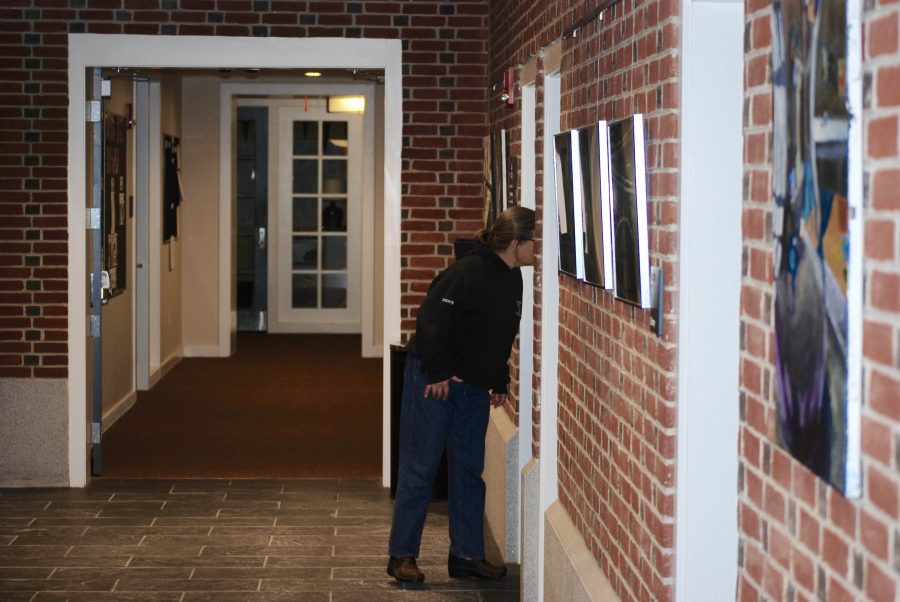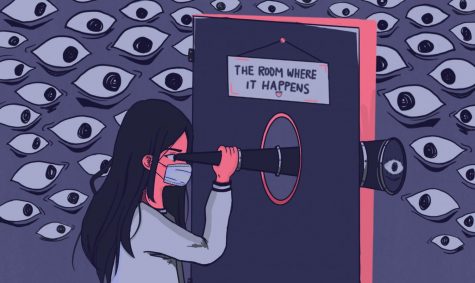Not all those who roam are lost
What’s the deal with Saturday night roaming?
It is a Saturday night. The student center is full of dancing teens, dominated by the stench of hormones and sweat-soaked DIY muscle tees. Slowly, as the night progresses, groups break off and exit the dance floor. They find relief in the rush of cold air that meets their faces, but little in the row of teachers watching their departure.
This infamously awkward exit is the first sign of faculty over watch on Saturday nights. After students leave the Dining Hall, they often encounter “roamers,” faculty who are assigned to wander the campus.
Every week, faculty members on duty help with weekend activities. Some are assigned to drive “toasters” to student events off campus, others help in implementation of events, like dealing cards at Casino Night, but no matter the scheduling for the weekend, some teachers are always assigned “roaming.” In Ted Goodrich’s words, to roam is “to be a presence.” He said in an interview, “I walk through the building and just make sure everyone’s safe and everything’s okay.”
In its current implementation, however, roaming duty does more harm than good for the community. While the necessity for faculty oversight is understandable, the current system fosters distrust between students and faculty, an amplified sense of limitation for students, and a greater urge to breaks those limits.
I will start with the disclaimer that I fully acknowledge the need for faculty presence. Keeping kids safe involves inhibiting dangerous behavior like substance abuse and reckless endangerment, while being a nearby resource for health emergencies. Roaming, however, has strayed from that goal.
While Mr. O’Donnell cites various other reasons for roaming, a common belief among students is that certain teachers, when on roaming duty, are surveying the campus in order to stop students from engaging in sexual activities. “Students at Groton are still trying to understand their sexuality. It is important that faculty understand this, and not shield us from the inevitable,” said Mims Reynolds ‘17. While she acknowledged the school’s responsibility to intervene in cases without consent, she believes that having a healthy relationship at Groton is only made more difficult by the feeling that being alone with a significant other is “wrong.” Madame Stanton acknowledged that this struggle exists on campus, saying, “I think the culture allows for no real privacy.” She continued, saying that roaming duty involves monitoring public spaces. “Students should not have to feel that public places are the only place for them to have private interactions,” she said. Of course, this can cause awkward situations for the co-inhabitants.
The most obvious frustration for students regarding these situations is the response from faculty and administration. On page thirty-seven, the Student/Parent Handbook says that when students are caught engaging in sexual behavior, or in a scenario that suggests sexual behavior has occurred, “the school will generally respond to the situation as a health issue, which may include notification of parents and, as appropriate, referral to the Health Center or Counseling Office.” The issue here is ambiguity, highlighted by the words “generally” and “may.” Students don’t know whether their private sexual encounters will be brought to their parents or to the Health Center. When questioned about this passage, Mr. O’Donnell commented that these words are intentionally vague. “Any time you write a policy, you have to try to preserve the flexibility to handle situations in the most appropriate way possible,” he said, “otherwise you end up trapped in your own policy.” He also pointed to many situations outlined in the handbook with clear handling procedures, such as those involving behavior prohibited by law or that violates school rules. He clarified, explaining that, “no two situations are ever alike” and it is under the judgment of the deans, when brought information, whether contacting parents and/or the Health Center is appropriate. This flexibility, however, may not have its intended effect. Students are led by the ambiguous language to assume the worst, creating a deep fear of faculty roamers.
This fear and distrust acts as its own kind of pressure for students to break other school rules. This “give us more faith” mentality, as Mr. Goodrich describes it, can escalate to a sort of personal rebellion. “They are always going to want more freedoms.” Students go to extreme extents to avoid being caught, which can lead to other disciplinary infractions such as illegal intervisitation, breaking curfew, or abusing driving permissions. “It shouldn’t have to come to that to maintain a healthy relationship,” said Lauren Kochis ‘17. With a more direct communication of policy, students would feel less inclined to hide their relationships.
There is a clear sense of resentment from students and faculty alike as a result of the situations that roaming creates. Students feel faculty members are being unfair to their right for a healthy relationship and faculty feel students aren’t respecting the need for supervision. The solution to this dilemma is quite simple: communication. In its current implementation, roaming is a duty dreaded by most “roamers” and “roamed” alike. With open dialogue between students and faculty, this duty could accomplish its goal without hindering the community: keeping kids safe.

Lily Cratsley '19 is very excited to step into the role of Editor-in-Chief of the Circle Voice. Since fourth form she has been a consistent contributor, writing for...












